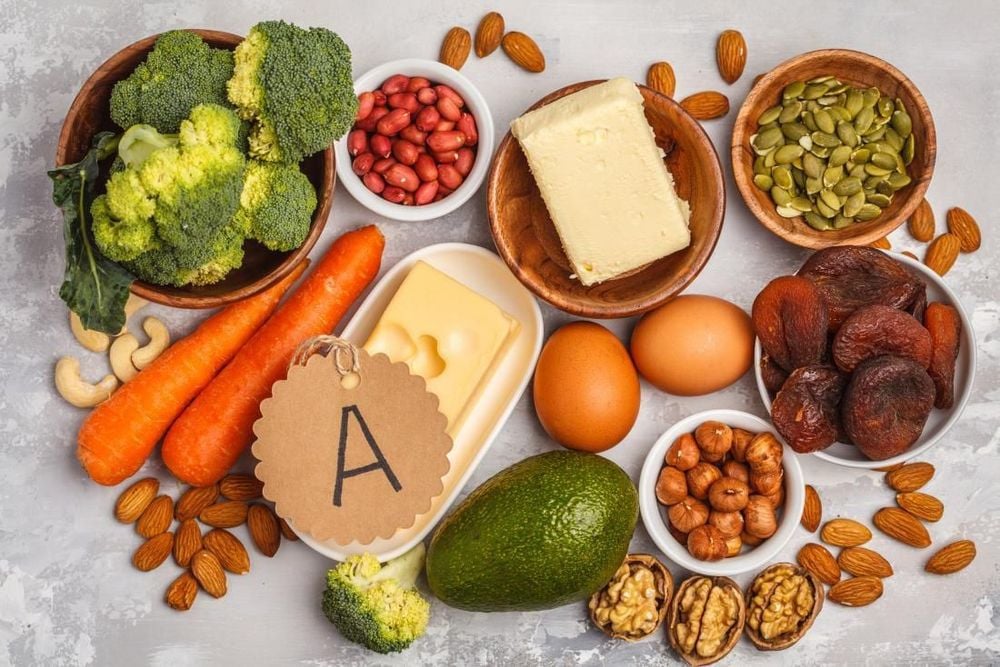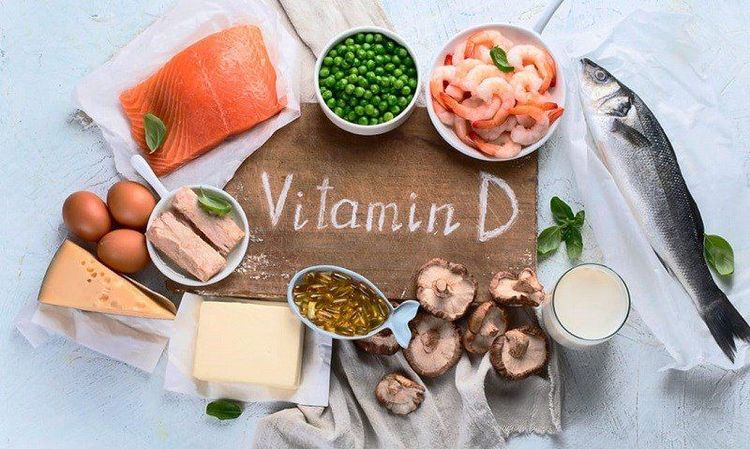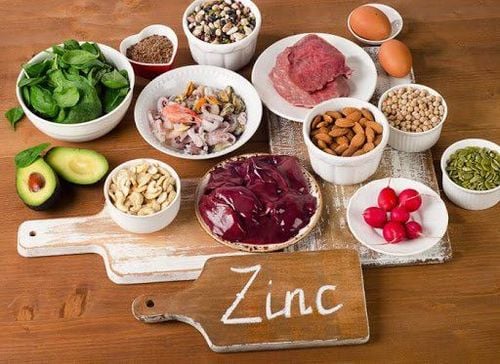To know which vitamins a 1-year-old, 2-year-old, or 3-year-old child needs, parents must understand the child's needs to provide sufficient essential vitamins and minerals.
1. Why is it necessary to supplement enough vitamins for children?
Vitamins are essential nutrients that are recommended to be supplemented for children. This is an essential substance that participates in many activities in the body such as cell structure, metabolism to provide energy, and participates in the immune response process to help the body fight against pathogens.
Children may be deficient in vitamins due to a poor diet, anorexia, suffering from certain diseases that affect the absorption and metabolism of vitamins... When children are deficient in vitamins, it will lead to slow growth, slow physical development and suffer from certain diseases such as:
- Dry eyes and night blindness are caused by vitamin A deficiency in children;
- Children lack vitamin C easy to bleed, susceptible to infectious diseases;
- Vitamin B1 deficiency causes beriberi and neuritis;
- Vitamin K deficiency May increase risk of bleeding;
- Vitamin D deficiency Reduces calcium absorption causing bone disease, reduced resistance...
Therefore, each child is recommended to supplement adequate vitamins to avoid the risk of certain diseases and help the body develop comprehensively. But for each stage of development, children need a certain level of needs, parents need to know so that they can provide enough, not too little or too much, which will also cause negative consequences for the baby's health.

2. What vitamin supplements do 1 year old, 2 year old and 3 year old children need?
Ages from 1 to 3 are the period when children need all kinds of vitamins such as A, B, C, D, E, K. Vitamin supplementation needs to depend on the needs of each child's age. Therefore, to know what vitamins children need to supplement at their 1, 2 or 3-year-old?, parents need to understand their children's needs to get enough essential vitamins and minerals.
Below are the vitamins that children 1-3 years old need to supplement:
Vitamin A
Vitamin A is an essential ingredient for cell development in the retina of children's eyes, helping to develop vision and prevent dry eyes. In addition, it also protects the epidermal cell layer that covers the skin surface, reducing the possibility of infectious diseases for children.
Children's need for vitamin A at this stage is 400 micrograms per day. Children can supplement vitamin A sources through red-yellow foods such as spiny orange fruit, carrots, dark green vegetables, egg yolks, animal liver...
Vitamin B
If you are wondering what vitamins do 1 year old children need to supplement? You should not ignore the vitamin B group. This is a very important vitamin group for children, including vitamins B1, B2, B6, B9, B12. Each type has special functions, but in general, vitamin B is essential in metabolism in the body, in addition to helping protect the cardiovascular system, protect the nervous system and support increased immunity.
- Demand vitamin B1 (Thiamine) is 0.5 mg per day. Sources of supply are found in foods such as: Wheat flour, bread, legumes, cereals, lean meat...
- Demand vitamin B2 (Riboflavin) , about 0.5 mg per day, can be supplemented through products such as meat, eggs, cheese, green vegetables, and whole grains…
- B3 (Niacin) requires about 6mg per day. Foods containing B3 include: Avocados, cereals, tuna, eggs, poultry, legumes, potatoes,...
- Vitamin B6 (Pyridoxine) daily requirement is about 0.5 mg. It is found in avocados, bananas, beans, poultry, whole grains…
- Vitamin B9 (Folic Acid) requirement for children 1 to 3 years old is 160mcg per day. Foods that contain a lot of B9 such as asparagus, broccoli, radishes, beans, grains, dark-colored vegetables...
- Vitamin B12 (Cyanocobalamin) requires about 0.9 mcg per day. Supplement through meat, eggs, milk, soy milk, poultry, shellfish...
Vitamin C
Vitamin C participates in the formation of certain enzymes, so it is important in helping the body prevent infections, increase resistance, in addition to supporting the absorption of some nutrients such as iron and strengthening blood vessel walls.
For children at this stage, they need to supplement 30mg of vitamin C per day. Foods rich in vitamin C such as cabbage, broccoli, cauliflower, citrus fruits, guava, spinach, strawberries, tomatoes...
Vitamin D
Vitamin D helps regulate calcium and phosphorus metabolism in the body, increasing children's resistance. If children lack vitamin D, they are susceptible to irritability, cramps, stunting, etc.
Children's need for vitamin D at this stage is 600UI per day. Vitamin D is provided mainly through exposure to UVB beams in the sun, with limited dietary sources such as salmon, mackerel, herring, fish liver, milk, yogurt, butter, and ice cream. ..
Vitamin E
Vitamin E participates in metabolic processes in cells, preventing oxidation. Limit the risk of atherosclerosis, prevent oxidation, enhance the immune system...
Demand vitamin E about 5mg per day. Sources include avocados, dark green vegetables, vegetable oils such as corn and sunflower; papaya; nuts; nuts; wheat...
Vitamin K
Vitamin K participates in the process of bone metabolism, forming blood clots, preventing the risk of bleeding.
The vitamin K requirement of children 1 to 3 years old is 13 mcg per day. Sources include foods such as cabbage, cauliflower, cereals, dark green vegetables, animal liver, meat, eggs, fish...

3. Be careful when giving vitamin supplements to children
When supplementing vitamins for children, parents should be cautious:
- Most vitamins are found in fruits and vegetables, so parents should let their children eat a lot of fruits and vegetables regularly. Sunbathe children properly.
- Supplementing vitamins through food is good, but not all children are willing to coordinate their diet with their parents. Parents need to divide meals into small portions, drink enough water, prepare a variety of foods, and create a happy atmosphere so that children can eat well.
In short, children 1 - 3 years old need to be fully supplemented with necessary micronutrients such as: Zinc, selenium, Chromium, Vitamins B1 and B6, Ginger, cherry fruit extract (vitamin C),... to improve taste perception, enjoy meals, achieve standard height and weight, strengthen immunity to reduce minor illnesses, and minimize digestive issues. In case the child is lazy to eat and shows signs of vitamin deficiency, parents need to take the child to the doctor so that the doctor can prescribe vitamin supplements.
LAMINKID I Health Protection Food:
The product has the effect of supplementing minerals and vitamins for the body. Supports digestion, enhances food absorption, helps children eat well. Supports improving children's resistance, helps reduce the risk of diseases due to poor resistance such as upper respiratory infections and flu.
Intended users:
- Children have anorexia, poor absorption of food, children are weak, malnourished, and retarded in development.
- Children have poor resistance, are sick or have just gotten sick, children often suffer from upper respiratory infections and flu.
Responsible for product quality:
Elepharma Pharmaceutical Joint Stock Company
No. 9, Truong Cong Giai Street, Group 17, Dich Vong Ward, Cau Giay District, Hanoi City, Vietnam
(Tel) 1800 6091; (E) info.elepharma@gmail.com
See more information about the product at: https://i.vinmec.com/laminkid
Register for nutritional consultation for your baby at: https://i.vinmec.com/dangkytuvandinhduong













